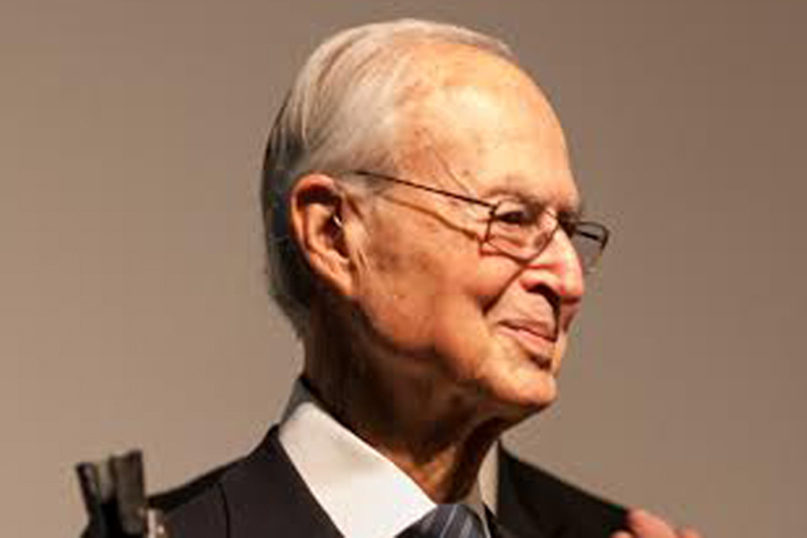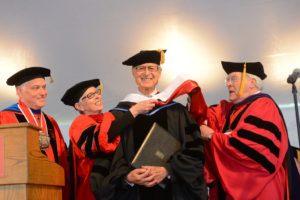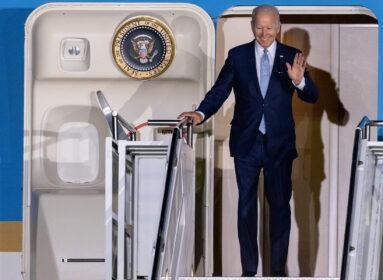
By Stacey Dresner
WEST HARTFORD – Rabbi Stanley Kessler, founding spiritual leader of Beth El Temple in West Hartford, died on Thursday, May 30 at the age of 95.
Rabbi Kessler served as spiritual leader of the Conservative synagogue from 1954, a year after it opened in West Hartford, until his retirement in 1992.

In the 1960s, during the Civil Rights Movement, Rabbi Stanley Kessler marched with Dr. Martin Luther King Jr. in Birmingham and Selma, Ala.
A longtime civil rights activist, he took part in the 1960s protest marches from Selma to Birmingham, Alabama, led by Dr. Martin Luther King Jr., and he was among the demonstrators on the National Mall in Washington, D.C. in August of 1963 when Dr. King delivered his famous “I Have a Dream” speech in which he described his dream of civil rights for all people.
“I reverberated to that speech,” Kessler told CJ: Voices of Conservative/Masorti Judaism in 2007. “Any decent person in the world reverberates to such words. My whole life has been bound up with such pronouncements, in one form or another. We all have dreams; my dreams are part of what infuses my trying to be a responding Jew.”
One of the rabbi’s dreams was to see the newly created Beth El Temple flourish.
“He worked hand and glove to make this place work,” said Kessler’s successor, Rabbi James Rosen. “It was a new venture for this congregation to come out to West Hartford and he really sought to help it to grow and to thrive.
“At the same time he pursued his intellectual interests. He was really a force for Jewish education and cared very deeply about it. He always sought to speak his mind when it came to his moral and ethical concerns and what he believed Judaism had to say about the current events. He was not shy about those things.”
Born in 1923 in Bethlehem, Pennsylvania, Kessler was raised in a Conservative Jewish family in Philadelphia. During World War II, he served as an aerial gunner and radio operator on a B24 Liberator, part of the 15th Expeditionary Mobility Task Force of the U.S. Air Force for nearly three years, flying 18 missions over Europe.
After the war, in 1947, he married Maurine Evnan, who would go on to become a renowned audiologist. The couple raised two children. Maurine died in 2011.
Ordained in 1951 at the Jewish Theological Seminary of America, where he also earned a Masters of Hebrew Literature and Doctor of Divinity, in 1949 he was among the first students to spend a year in Israel, where he studied with Martin Buber and Gershon Scholem, among other eminent scholars.
The Kesslers arrived in West Hartford in 1954, where the rabbi was the first to take the pulpit of the one-year-old Beth El.
Longtime Beth El member Roz Rachlin knew Rabbi Kessler for 59 years.

Rabbi Stanley Kessler receiving his doctoral hood from (l to r) University of Hartford President Walter Harrison, Provost Sharon Vasquez and Regent Arnold Greenberg in May 2014.
“When my husband and I first came to Beth El right after we moved here, we were impressed with Rabbi Kessler,” she said. “What we admired about him was he was so kind, always au courant, always concerned with what was happening in the world and the country at a given moment, and he would talk about it in his sermons sometimes to his detriment. Some people didn’t like it and it became controversial. [They would say] ‘Should Rabbi Kessler be talking about what is on the front page of the newspaper or should he be sticking to the midrash of the week?’”
In 1973, Kessler led the effort to have women be counted as part of the minyan at Beth El.
“It was something that was not very prominent in the Conservative movement but he wanted women to be counted. He was the first of that generation of rabbis that advocated for women’s rights,” said Rachlin, who was the first woman at Beth El to do a haftarah.
In 1964, Kessler was awarded life tenure at Beth El. He became rabbi emeritus in 1992.
In 2003 as part of the celebration of Beth El’s 50th anniversary, the vestry was named after him.
In retirement, Kessler continued to participate in life at Beth El, but graciously deferred to the new, incoming rabbi.
“He was a perfect gentleman about everything in his life,” said Rosen. “As much as he was rabbi at the synagogue for 38 years, he had every desire to help me succeed and to help the congregation continue to grow. He was constantly encouraging. We had different styles of doing things but he was very respectful of what I was trying to do and supportive, and conveyed that message far and wide.”
His retirement allowed the rabbi to travel to locations around the world as well as Israel, which he visited more than 60 times.
In 1997, he spent six months as a visiting rabbi in a congregation in South Africa. As recently as two years ago, he took part in a rabbinic institute at the Shalom Hartman Institute for Conservative Judaism in Jerusalem.
Kessler was past national chair of the Rabbinic Cabinet of the United Jewish Appeal. He served on the National Rabbinical Assembly as a member of the Executive Council, the Committee of Law and Standards, the Placement Commission, and as Chairman of a National Rabbinical Assembly Convention and the organization’s first Bio-Ethics Committee. At the Jewish Theological Seminary, he was a member of the Board of Overseers and the Chancellor’s Rabbinic Cabinet, and had served as director of “Gateways,” a JTS-sponsored national outreach program to intermarried couples. For more than 25 years he was on the Board of Governors of the Synagogue Council of America.
A student of Rabbi Abraham Joshua Heschel, throughout his life Kessler remained dedicated to the civil rights cause. He was among 20 rabbis who formed the first organized group to join in the efforts of Dr. Martin Luther King Jr., traveling in May 1963 to Birmingham to demonstrate with the Freedom Riders, and again in Selma in 1965.
“At that time – and it’s no different now – I felt that, my God, the world needs changing, as naïve as that sounds,” Kessler told CJ: Voices of Conservative/Masorti Judaism in 2007. “I had to do something, take some significant step, and I’m sure that my colleagues felt that as well. In spite of the existential threats, we had to take a stand.”
While Rosen said he knew that Kessler had marched with Dr. Martin Kuther King Jr., it wasn’t until he arrived at Beth El and got to know Kessler that he realized “the depth and involvement and the degree of remarkable courage and leadership Rabbi Kessler displayed helping to rally the Jewish community around support for civil rights.”
An anti-Vietnam War activist, Kessler was among the founders of Clergy and Laymen Concerned and Rabbis for Human Rights. In Connecticut, he had served on the Human Rights Commission of Hartford, the Human Experimentation Committee of the University of Connecticut Medical School, the Martin Luther King Commemoration Committee, and the United World Federalists of Greater Hartford, where he was chair. He was also a past member of the boards of directors of the Community Renewal Team, the Urban League, the Urban Coalition of Greater Hartford, and the Connecticut Interfaith Housing and Human Services Commission.
A former correspondent for the Hartford Courant, he also taught in the Trinity College department of religion from 1967 to 1973 and the University of Hartford philosophy department. He held honorary doctorates from Trinity College, JTS, and the Graduate Theological Foundation, and received a Charter Oak Vision Award in 2012.
In 2016, Rabbi Kessler received the Lifetime Achievement Award from T’ruah: The Rabbinic Call for Human Rights.
Stanley Kessler is survived by his children, Dr. Abigail K. Hanna and Jonathan J. Kessler; a granddaughter, Georgine Hoge; a brother and sister-in-law, Arnold and Naomi Kessler; and numerous nephews and nieces.







 Southern New England Jewish Ledger
Southern New England Jewish Ledger















